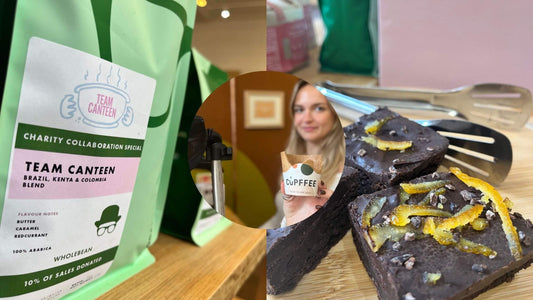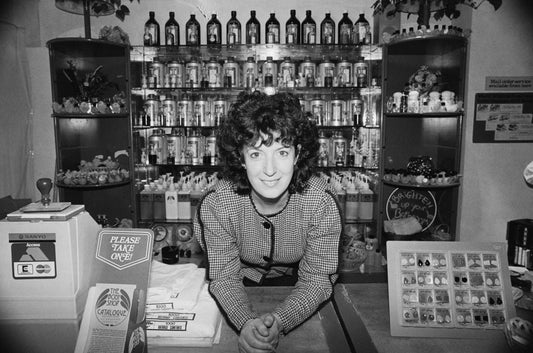Today, join us as we take a look at the terms: biodegradable, compostable and recyclable - because they’re hella confusing!
In general terms, biodegradable means the item can break down naturally (by living things, including bacteria) without the need for added chemicals. Biodegradable items can take weeks, years or centuries to decompose and still - despite what you might think - technically be classed as ‘biodegradable’. Although biodegradable items do decompose, they may leave a waste product that may not be beneficial to the soil. As a general rule of thumb, anything that is plant-based or natural mineral-based is usually biodegradable, for example biodegradable plastic such as ‘Vegware’, paper, and natural fabrics such as linen and cottons. Pretty good, right? Well we can go even better!
Give a round of applause to compostable materials, which go one step further than biodegradables by providing the earth with nutrients once the material has completely broken down. Lucky soil! While biodegradable materials are designed to break down within landfills, compostable materials require special composting conditions. A compostable item will usually take about 90 days to break down leaving no trace, making it kinder to the planet, kinder to the soil, and kinder to us.
However - beware! Only a minority of items are actually home compostable, so, the label “compostable” most often means industrially compostable. Unfortunately, most “compostable” items won’t decompose very quickly - or at all - on your home compost heap (unless it’s food scraps) but, luckily, will break down inside the right kind of industrial equipment.
It ain’t looking so good right now - the UK’s waste system isn’t yet ready for compostables at a household level, and the country is home to only fifty industrial composting facilities, meaning consumers are left with no option but to put the (so-called) ‘compostable’ item in the general waste - where inevitably it’ll head to landfill or incineration. Any ‘compostable’ cups found in food waste bins are currently being fished out and sent to landfill, despite the potentially misleading packaging.
Imogen Napper at the University of Plymouth collected carrier bags with various claims about biodegradability, and put them in different natural environments over three years to test how they would decompose. She tested biodegradable, compostable, and oxo-biodegradable, as well as conventional polyethylene bags. Her results were fascinating, and you can read about it here.
But, don’t lose hope - in researching this I’ve seen how some new materials are going to become ever more important, not just with our day-to-day consumption, but also with the makers we stock at Prior.
An interesting case study is that of cellophane - yes, that crinkly clear thin plasticky film that’s used to wrap prints, greetings cards and bunches of supermarket flowers in. Well, all is not quite as simple as it may first appear, because there are different kinds of cellophane with different properties - and becoming more familiar with these kinds can not only empower you to make eco-friendly choices yourself, but can also help inform you about the products our makers use. Keep reading to become a cellophane connoisseur!
Perhaps unsurprisingly to those of you who paid attention in Biology class, cellophane is made of cellulose - plant matter. Plant materials and wood pulp are processed into a flexible, clear ‘plastic-like’ material. However it’s not quite as simple as that, and there are a few different kinds to be aware of:
- Uncoated cellulose film - made of organic matter; moisture-proof but not water-proof.
- Coated cellulose film - made of organic matter, but coated in chemicals and plastic to improve flexibility, water-resistance, and longevity.
- Polypropylene film - a plastic made from petroleum, not organic materials. Confusingly, this kind of film looks identical to the previous two, making it tricky to spot (and very difficult to sort at the end of its life).
The word cellophane has become the blanket term for any plastic-like material that’s used for wrapping - whether it’s made from organic materials or chemicals. And that, my friends, is why it’s so difficult to sort, and why it can cause such a tricky situation further down the line.
Our makers at Prior, however, have done their own research about the packaging they use, so that you don’t have to (lucky things.) Find below some information on some of our printmakers and designers’ packaging materials, and the vast, wide world of cellophane, here:
Rosie Reiter
‘I get my packaging from transpack - this is their blurb: Eco-friendly, Clear Biodegradable Bags for Photos and Artwork and Greeting Cards made from 30mu Nativia® PLA film. Nativia® film is made from renewable resources. PLA bio-based resin is sourced from corn or other sources such as sugar beet and potatoes among others.
The film is fully industrially or mechanically compostable or chemically recycled, according to the EN13432 standard and has achieved the OK BIOBASED certificate from Vincotte. This certification means that it will break down quite quickly into carbon dioxide, water and biomass by microbial digestion in the right conditions.
Nativia® Greeting Card Bags are Food Safe as well as being eco-friendly and have excellent properties: heat sealable, high stiffness, good oxygen barrier and good slip properties.’
Check out her work here!
Ash Leaf Printing
‘I use transpack for my prints and eco-craft for my greetings card bags. Both are biodegradable and eco-friendly.’
Check out their work here!
Shape of Home
‘We use eco craft biodegradable and compostable bags, made from vegetable starch’
Check out their work here!
KnitLuxe
‘We use biodegradable cellophane from Oasis Floral. It’s entirely biodegradable!’
Check out their work here!
Written by Hilda Allen (@honest.weaves).
Edited by Florence Williams (@florenceceramics).
| Sources: |
https://bristolwastecompany.co.uk/faq/food-waste-faqs/
https://rudehealth.com/blogs/in-rude-health/packaging
https://resource.co/article/how-recycle-biodegradable-coffee-cups-13020
https://www.gov.uk/government/news/plans-unveiled-to-ban-single-use-plastics




